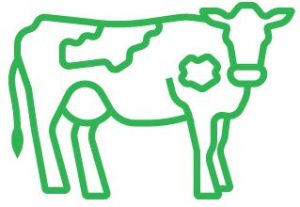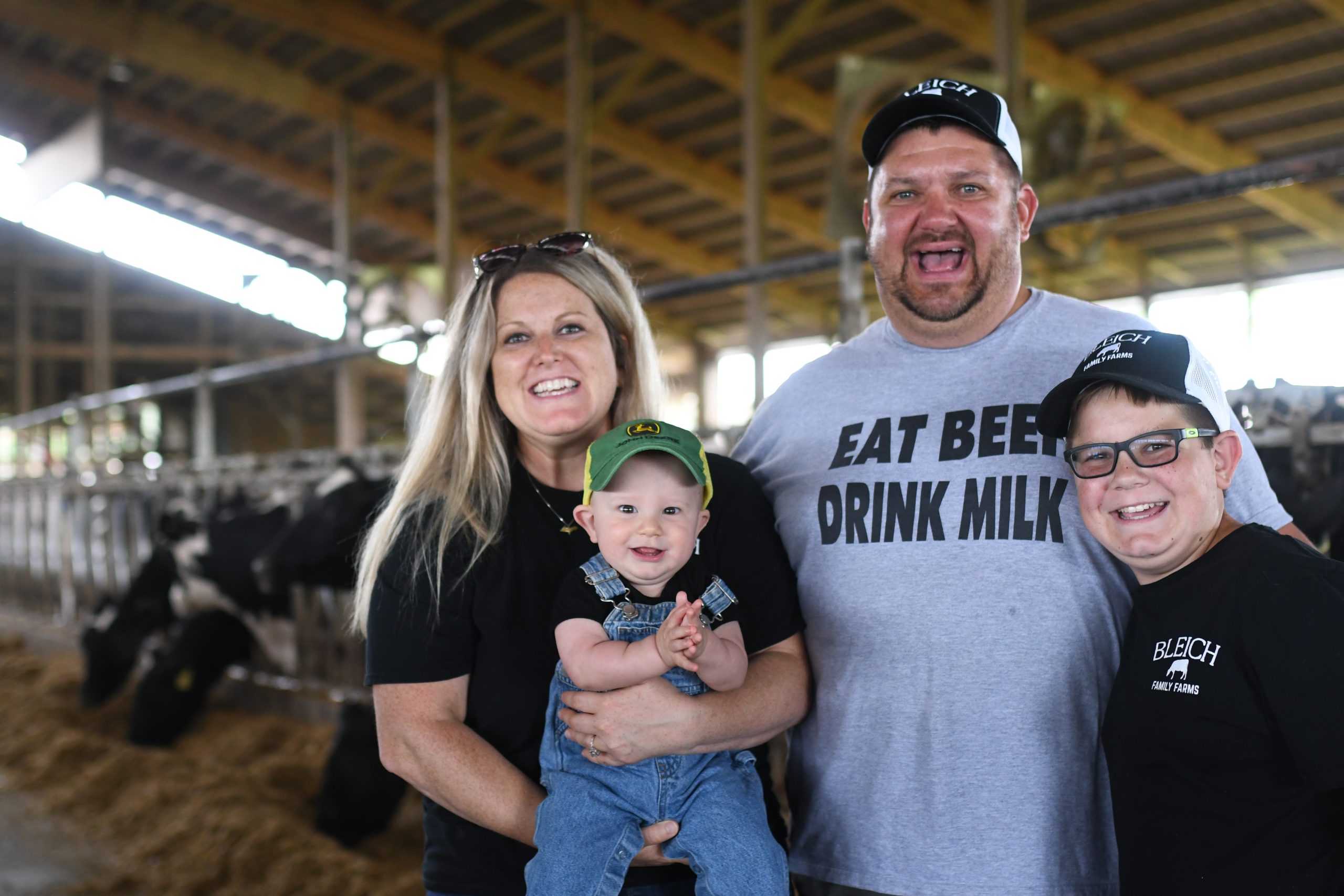MMPA is committed to cooperative social responsibility and sustainable business practices throughout our entire supply chain. At the farm level, MMPA members are also on a sustainability journey. We’re checking in with a handful of member farmers leading the charge with this sustainability spotlight series.
 Pictured back to front, left to right: Jenn Bleich, Eric Bleich, Otis Bleich, and Sutton Bleich
Pictured back to front, left to right: Jenn Bleich, Eric Bleich, Otis Bleich, and Sutton Bleich
The Bleich family does it all on their 1,000-cow dairy in Hudson, Michigan. Eric and Jenn Bleich of Bleich Family Farms have diversified their dairy operation to be both financially and environmentally sustainable.
“We’ve been selling pasture raised Angus-Holstein crosses as halves and wholes for several years in the Upper Peninsula of Michigan. My wife is from the area and has connections with the American Legion that allow us to market our beef,” Eric said. “We’re doing it to give a little extra niche to what we do.”
Along with raising beef, the Bleich’s custom chop feed for local farmers and custom manure haul as time allows. Diversifying the business is a tactic Eric has taken advantage of to ensure their farm’s sustainability. “We do all the custom work so that we can spread out our risks. If the price of milk is down, we can at least have some extra revenue coming in to help balance things out,” Eric said.
Eric is also a member of the Western Lake Erie Basin Advisory Group. He is one of two dairy farmer representatives in the group that comes together to discuss ways to improve the water quality of the basin.
“There’s a wide variety of people on this board who bring a lot of new ideas to the table for solving the problem,” Eric said. “Having people like myself in the group puts a face to the farmer, and since I’ve been on the board I’ve realized that while we hear about these groups that we may see as a threat, at the end of the day, we all have to meet the same goals and none of us want to harm our environment.”
On Bleich Family Farm, Eric has taken his own steps to maintain and improve water quality on the dairy. “We are a permitted Concentrated Animal Feeding Operation (CAFO) and have zero discharge. We’ve done a lot of work with the Natural Resources Conservation Services (NRCS) to keep barn roof runoff water clean and away from the facility.”
For 22 years the farm has also been applying manure with a dragline and an airway. Eric described that the dragline is a minimum tillage tool that works to reduce runoff. Weather forecasts are also considered when applying manure. “We’ve been fully following our Comprehensive Nutrient Management Planning (CNMP) guidelines, we retain our setbacks and if we have a forecast predicting rain, we don’t apply.”
Per regulation, manure samples are required twice a year, but Eric and his crew are going the extra mile to take samples once if not twice everyday that they’re applying. “I had 10 different samples from this spring to see the variance from the first to last day we started hauling, and there is a significant difference in what we’re putting down.”
By taking additional samples, Eric can see the true value manure provides the crops he grows on the soil. “Manure is a good thing. It has all the natural nutrients that our crops need and if we can manage that right, put it where it needs to be, when it needs to be there for the plant, then we’re being sustainable by using the nutrients that we have.”
Eric takes pride in the dairy’s success in becoming more efficient, including recent efforts to reduce their power consumption. Several management decisions have led the dairy to reduce their energy usage by 47.12% from 2021 to 2023. “I am proud of the reduction in our power consumption. We have reduced our footprint because we have reduced our usage of electricity. We’ve become more efficient users of that resource.”
Energy has been reduced by installing LED lights, temperature sensors on fans, variable frequency drive’s on well pumps and milk pumps, and most recently the installation of a chiller. The use of the chiller has made cooling milk easier and reduced the number of compressors needed from five five-horsepower compressors to one nine-horsepower compressor.
The energy savings on the farm are just one of the opportunities Eric and Jenn Bleich have taken advantage of to stay sustainable, and to ensure longevity in the dairy industry.
Dragline Manure: A dragline hose system allows manure to be pumped through a hose from the farm to the field where it can be applied to the soil. This approach reduces compaction caused by the weight of tractors and equipment and can reduce odor from field application.
Certified Animal Feeding Operation (CAFO): An animal feeding operation that either meets a certain animal population threshold, or, regardless of population, is determined to be a significant contributor of pollutants to waters of the United States.

FARM
Bleich Family Farms
Hudson, Michigan

HERD
1,000 Holstein milking cows

LAND
2,500 acres of corn and alfalfa

VERIFICATIONS
MMPA Sustainability Survey, Comprehensive Nutrient Management Plan, FARM* Animal Care
This article was originally published in the September/October 2023 issue of the Milk Messenger. Subscribe »

